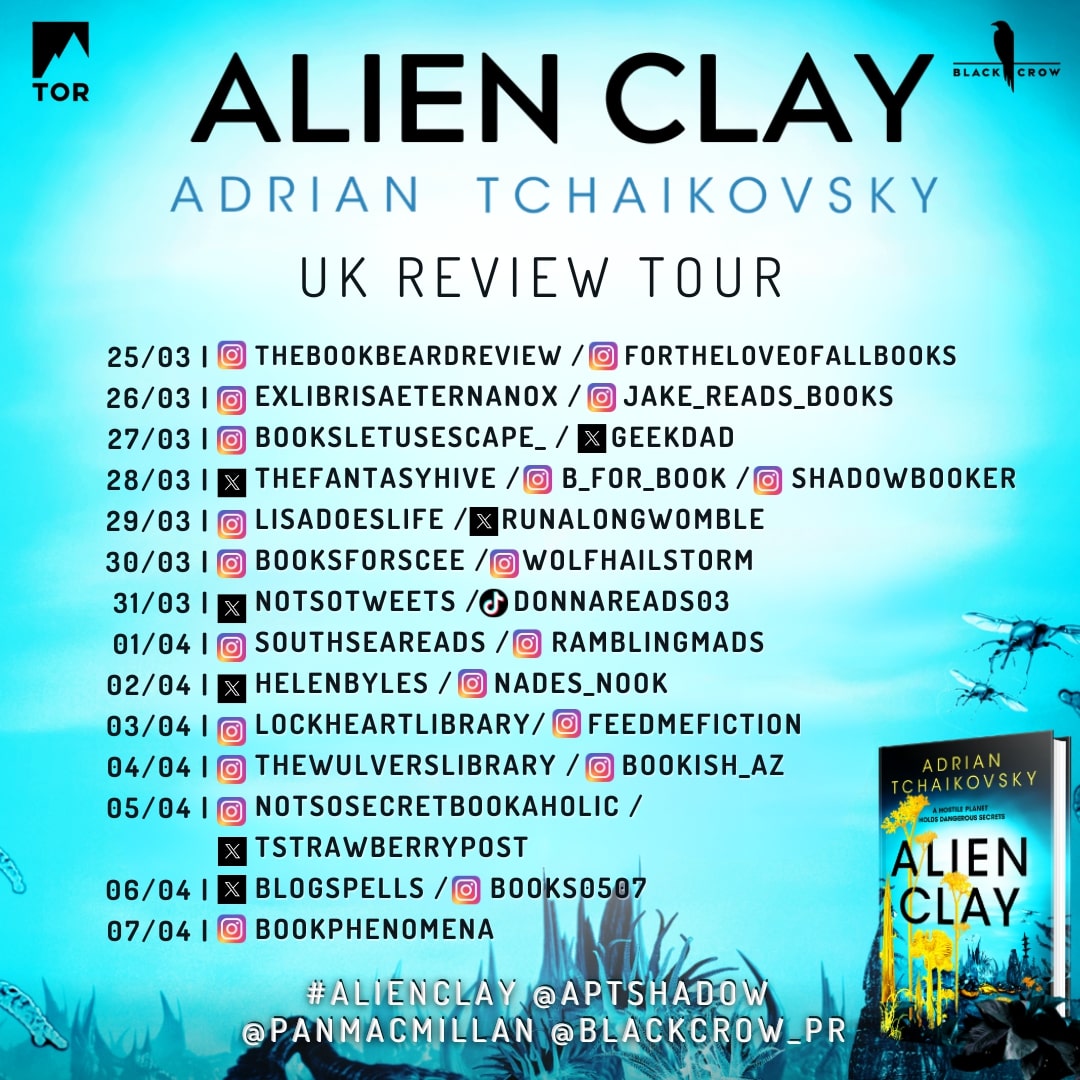I’ve read and reviewed several novels by Adrian Tchaikovsky for GeekDad. His output is prodigious. Tchaikovsky is, as it says on the back of Alien Clay, “one of the finest writers of SF right now.” What amazes me, is not the number (and often length) of his novels, but how different they all are. Adrian Tchaikovsky is not an author who regurgitates the same ideas in different places; he is not a peddler of derivative science fiction. His novels are stuffed full of ideas, both scientific and political.
What Is Alien Clay?
For an Adrian Tchaikovsky novel, Alien Clay comes in at a slim 385 pages. It’s probably a standalone novel too; it doesn’t need a sequel, but who knows where the author might decide to go next?
Alien Clay is set in Earth’s future. Travel beyond the solar system is now possible, though it takes a long time. Earth is ruled by a government called “The Mandate,” which is as fun and liberal as it sounds.
Our narrator, Anton, was an academic back on Earth. His liberal sensibilities got him into trouble and after being rounded up by the regime, he was frozen and sent into space. 35 years later he wakes as his capsule is about to land on the planet Kiln. Here he will take up residence in an “extrasolar labour camp.”
Kiln is one of a handful of extrasolar planets that contain life. Not just a invisible microorganisms, but a whole teeming ecosystem. There are even structures that appear to have been built by intelligent lifeforms. But where have the builders gone and what does the writing they left behind mean? These are just two of Kiln’s many mysteries. A small colony of humans is here to catalog what it can find, and perhaps solve the mystery of the builders. Kiln, unfortunately, is incredibly fertile and extremely deadly.
Anton, a scientist, is potentially useful to the camp’s commandant, but he is also a criminal, put here because of his crimes against the regime. The prison camp is a dictatorship in miniature. There are factions and suspicions among both inmates and the staff. If Kiln doesn’t kill you it’s only a matter of time before a human does. The trip to Kiln is a one-way ticket.
Why Read Alien Clay?
I have never encountered anything like Alien Clay. Most science fiction that presents us with alien life, gives us lifeforms predicated on a human understanding of what life is. They might be weird and wonderful but they’re almost always based on planet Earth’s chemistry, biology, and physiological processes.
Not so with Alien Clay. Tchaikovsky has created what I might cheekily describe as an “out of this world” physiology and ecosystem. He’s built an entire evolutionary process from scratch. I won’t spoil too much, but the life forms of Kiln take adaptation and symbiosis to crazy levels.
Much of the book’s enjoyment is derived from the interface between Anton and the native lifeforms of Kiln. The central “quest” of the novel is for the human settlers to understand the life forms they are interacting with. The novel highlights the inability of entities with a human, earth-based conception of life, to understand how alternative evolutionary pathways might manifest. This conundrum drives much of the narrative and it’s a fascinating journey.
At first, this makes reading Alien Clay bewildering, but, to be honest, I’ve come to expect this from an Adrian Tchaikovsky novel. He writes hi-concept novels, which have you questioning what is going on until slowly everything becomes clear. He often uses complex and rich language that enhances the storytelling but also has me reaching for the dictionary. Alien Clay is no exception.
In addition to its “fiction about science” elements, Alien Clay also serves as a dystopian novel, offering an examination of totalitarian power structures. The interplay between the various members of Kiln’s penal colony is fascinating. Who can Anton trust? Who can trust Anton? Almost, everybody on Kiln is there because somebody gave them up to the Mandate. Who gave up whom, are secrets that keep everybody glancing over their shoulders. The way in which the commandant spreads mistrust amongst both inmates and his staff is masterfully depicted; a masterclass in sowing distrust. The sense of creeping paranoia adds another layer of intrigue to this fascinating novel.
Science fiction that stands the test of time, opens its readers up to new possibilities and pushes the boundaries of what is possible. I love a good space opera as much as the next reader, but ultimately, they’re (usually) just conventional stories set in space. Books like Alien Clay go beyond that. They ask us questions about how we live our lives today, how we might like to live them tomorrow and make us wonder what exactly is out there, in the massive expanse beyond the Solar System.
If you would like to pick up a copy of Alien Clay you can do so here, in the US (published in September 2024) and here, in the UK. (Affiliate Links)
If you enjoyed this review, check out my other book reviews, here.
Don’t just take my word for it. This review is part of the Alien Clay blog tour. Check out loads of other great reviews at the following places!
I received a copy of this book in order to write this review.






Sounds a bit like Alan Dean Foster’s underrated 1985 novel “Sentenced to Prism” in which an investigator sent to search for a lost research crew on a silicon-based planet encounters life forms and intelligence based on a system totally alien to our own.
https://en.wikipedia.org/wiki/Sentenced_to_Prism